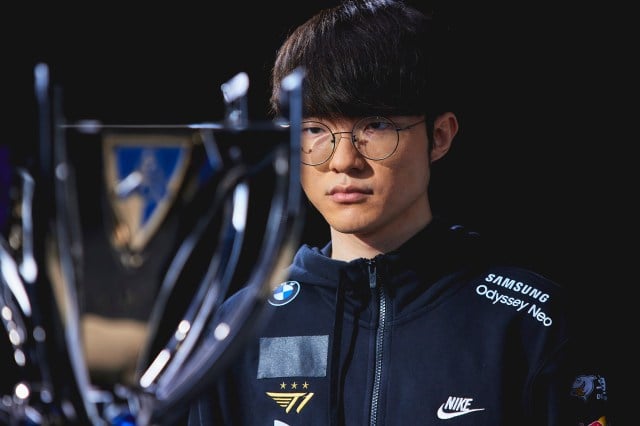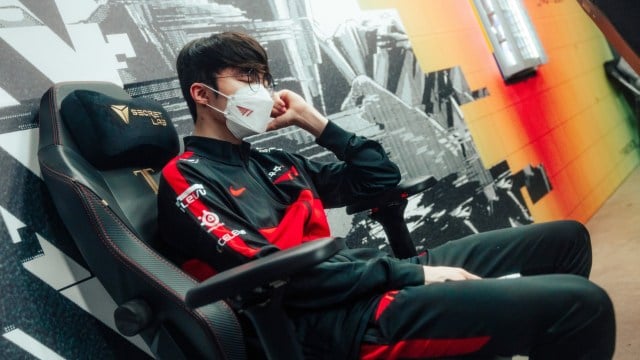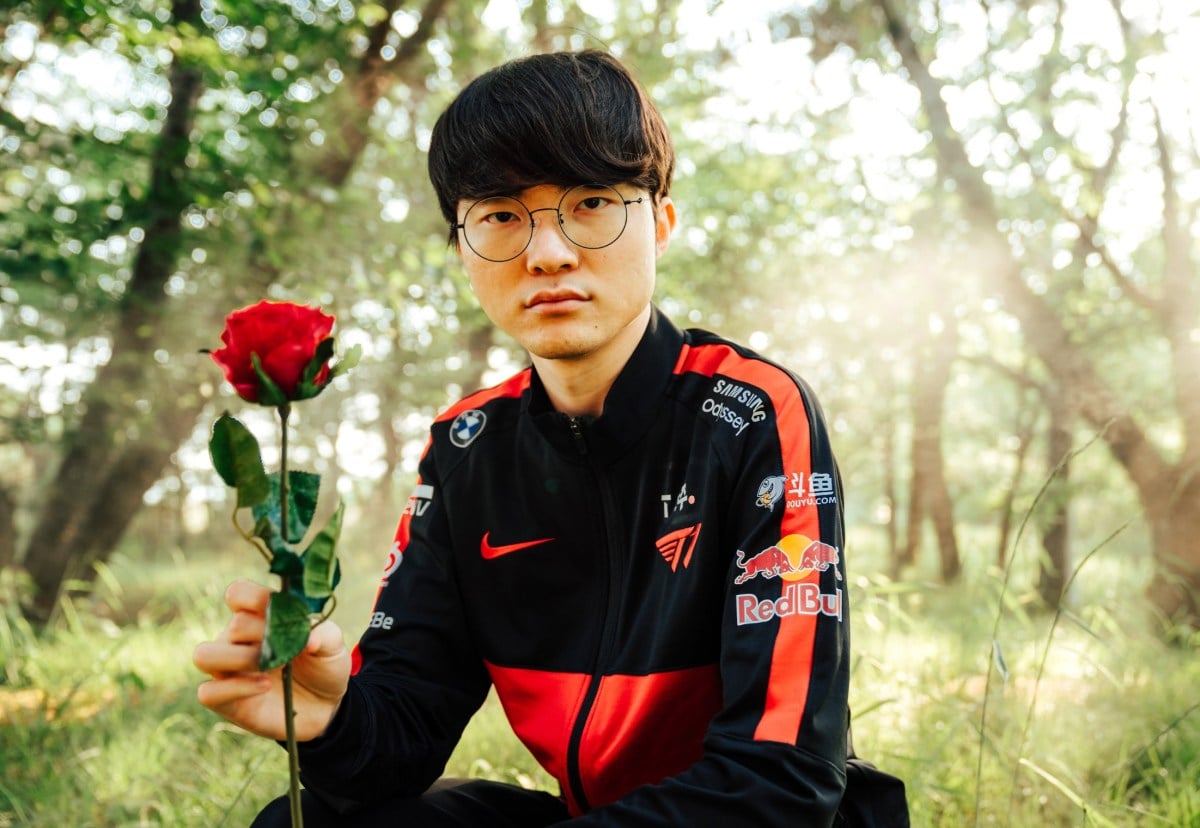It’s rare for esports pros to miss time due to physical injury—at least, relative to the frequency that it happens to traditional sports stars. But earlier this month, the arguably biggest esports star of them all—Faker—was forced to hit whatever the esports equivalent of the injured list is with an arm issue, and T1 is dealing with the cost of his absence.
Since Faker went down with an arm injury on July 2, T1’s League of Legends squad has posted an ugly record of 1-6 and is in danger of missing the LCK playoffs for the first time in five years. This experience—the one where losing a star player can completely derail a season—is part and parcel for sports fans; so much so that certain fan bases are completely desensitized to injuries and simply wait for the other shoe to drop each season. For esports fans, though, this is practically brand new—and T1 fans are getting the full experience firsthand.
We’ve covered the Faker injury saga pretty extensively this month, and throughout the entire process, my mind has consistently taken me back to one traditional sports star whose team is also feeling the dregs of an unparalleled, team-wide slump in his absence: Aaron Judge, an outfielder and the captain of the New York Yankees, as well as the reigning AL MVP.
And while the similarities between sports and esports have always been present, the mirrored effects that both players’ absences have had on their respective teams are too perfect to ignore or merely chalk up to coincidence.
T1 are the Yankees of LoL, in case you didn’t realize

If you’re a follower of both baseball and professional League of Legends, I could tell you that T1 is easily the best one-to-one comparison you could make to the Yankees, and there probably wouldn’t be much of an argument.
Apart from having the most recognizable brands in their respective sports, the two teams are always in contention. Both T1 and the Yankees have a solid history of not losing, in addition to making a deep title run practically every season. If you were to only start watching pro League at the semifinals of Worlds each year, you would have seen T1 make an appearance in four of the last six seasons. The Yankees have been to the top four of the MLB playoffs (the ALCS/NLCS) in three of the last six seasons.
You’d have to dig back through the archives of time (relatively, because baseball is older than League by just a bit) to find the last stretch that either team struggled for prolonged periods of time. In the last 10 years, the Yankees have only missed the MLB playoffs three times—the same number of times that T1 have missed the League World Championship.
And with so many parallels to draw between the two teams, it shouldn’t be too surprising that there are also parallels to draw between their two biggest stars and the injuries that have put their 2023 seasons in jeopardy.
It’s a one-man show out here
On June 3, Aaron Judge ran face-first into the right field wall at Dodger Stadium in an effort to catch a fly ball. He ended up crashing through the door of the Dodgers’ bullpen, slamming his toe into the concrete base of the wall and tearing ligaments in his big toe. He would end up on the injured list shortly after.
Faker, on the other hand, simply has a dead arm. These things happen when you play computer games for 11 years straight.
But while the flair and dramatics of the two stars’ injuries might be on opposite ends of the spectrum, the consequences of their absences are practically identical as both teams began to struggle to pick up the slack they left behind. There’s a broad difference between losing a good player and losing your best player, and in the case of both T1 and the Yankees, they each lost the best possible player they could have—and the two teams have struggled to fill the void they’ve left behind.
T1’s record with Faker in the lineup this split was 6-2, while their record without him is 1-6; almost the exact inverse. As for the Yankees, their record with Judge in the lineup this season is 30-19. Since June 4, the day after his injury, they are 19-23 and have since fallen into last place in the American League’s East division. Furthermore, the Yankees’ playoff odds have fallen to 32.4 percent, according to baseball stats and projections database Fangraphs. For reference, their preseason playoff chances stood at 81.2 percent—the third-highest among all teams in the MLB.
T1 are also sliding down the standings (they dropped from third place to fifth this month), but the distance they created between themselves and the rest of the LCK early on is enough to keep them afloat for now. Still, they’ve yet to clinch a playoff position and could fall out of contention should they lose all three of their remaining matches.
Additionally, the two stars’ absences are dragging down their respective teams’ overall stats. Most notably, the Yankees’ slugging ability has dropped significantly since their top power hitter hit the injured list. The team launched 1.57 home runs per game between March 30 and June 3, but have since only homered 1.12 times per game since Judge’s injury. Judge himself had an American League-leading mark of 19 home runs on the season when he injured his toe and was on pace to hit well over 50. Additionally, New York’s team-wide batting average was .237 between those same dates, and since Judge was sidelined, it’s fallen to .220, according to sports stats site Statmuse.
T1 had a 1.26 team-wide KDA with Faker (third in the LCK) while also sporting a gold difference at 15 minutes of 1,056 while he was in the lineup. Since his injury, their team KDA has plummeted to 0.70, while their early game gold differential is also negative at -529, according to League stats site Oracle’s Elixir.
In total, T1 without Faker looks a lot like the Yankees without Judge: lower overall production, fewer chances to instantly change the outlook of games, and less dependability in (quite literally) the middle of the lineup.
At least the subs are good, right? Right?
Wrong. Pretty much everyone who’s tried to substitute for either Faker or Judge over the course of their recovery periods has come nowhere close to putting up the numbers they did. And how can you fault them, really? They’re replacing players who have some of the best track records in their respective sports.
In the case of T1, 17-year-old rookie Poby has been given the full responsibility of filling in for Faker. And so far, it hasn’t been pretty at all. Not only has Poby missed the mark, but he’s fallen completely short of it, showing drastic differences in skill level and efficiency. Since making his debut on July 5, Poby ranks second-to-last among all LCK mid laners in KDA, last in kill participation, second-to-last in kill share, last in DPM, and second-highest in death share, according to Oracle’s Elixir.
| Statistic | Faker | Poby |
| Games played | 19 | 16 |
| KDA | 3.73 | 1.76 |
| Damage per minute | 616.6 | 432.1 |
| GD@15 | 39 | -177 |
| Kill participation | 61.4 percent | 56.8 percent |
While only one player has played mid lane for T1 during Faker’s absence, eight different players have suited up in right field for the Yankees since June 4.
Since that date, Yankees right fielders rank 21st in batting average, 16th in on-base percentage, and seventh in total home runs when compared to production values received from other teams at the right field position, according to Statmuse. All of Judge’s pre-injury numbers vastly trumped anything else that a Yankees right fielder has done since he went down.
| Statistic | Aaron Judge (March 30 to June 3) | All other Yankees RF (June 4 to present) |
| Games played | 49 | 43 |
| Batting average | .291 | .233 |
| On-base percentage | .404 | .307 |
| Home runs | 19 | 9 |
| RBI | 40 | 28 |
| Yankees’ winning percentage | 61.2 percent | 45.2 percent |
Delays, pushbacks, and radio silence

Both players have also suffered from delays in their recovery process. Both Faker and Judge were only meant to miss just a few weeks, but their teams have had to find ways to field replacements and fend off losing streaks for a bit longer than they intended.
Faker was originally meant to make his comeback on July 21 against Hanwha Life Esports, but T1 pushed back his return to the start of the LCK playoffs as he hadn’t been making progress at a quick enough rate to get him back on stage in time for the back end of the regular season.
Most signs pointed to Judge avoiding the injured list, but three days after the injury, Yankees manager Aaron Boon told reporters that Judge was unable to complete baseball activities and that he’d likely be sidelined indefinitely with no timetable for return. Thankfully for Yankee fans, the slugger was officially activated from the injured list today, just in time for a crucial road series against the first-place Baltimore Orioles.
T1 coincidentally has a date this weekend with a longtime rival who also happens to be in first place: KT Rolster. But Faker’s return is nowhere in sight, and the team will continue to field a substitute until the postseason arrives.
At least the Yankees won’t have to wait until the first game of the playoffs to get their star back—they’re fortunate enough to have him back just in time for the late-season playoff push.


